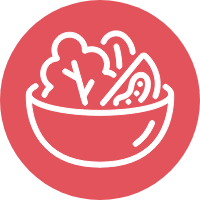- HealthBites for Diabetes Resource Hub
- Calcium: An Essential Nutrient For Your Bone Health
- How To Manage Your Cholesterol Levels
- How To Prevent And Treat Constipation
- How To Manage Your Diet and Health When You Have Diabetes
- How To Manage Diarrhea
- High Blood Pressure and Food Choices
- Everything You Need To Know About Probiotics
- What You Need To Know About Vitamin B12
- How To Manage Gas and Bloating
- Heartburn Relief
- Solutions To Manage Dry Mouth
- Celiac Disease: Gluten-Free Diet
- Osteoporosis Prevention: Keeping Your Bones Healthy
- The Importance of Vitamin C
- What You Need to Know About Folate
- What You Need To Know About Iron
- What You Need To Know About Potassium
- What You Need To Know About Magnesium
- What You Need To Know About Zinc
- What You Need To Know About Vitamin K
- All About Vitamin D
How To Manage Diarrhea

Here are some useful tips for you to try if you struggle with diarrhea.
Start With Your Diet Choices!
Diarrhea can be triggered by a variety of causes such as infection, allergies or even the medications that you are taking. Minor adjustments in your diet choices can help manage diarrhea and may help improve how you’re feeling.
Helpful Tips To Try:
- Avoid sugary drinks (such as soda pop, fruit drinks and chocolate milk) and sugary foods (such as cakes, cookies, honey and candy)
- Avoid certain artificial sweeteners (sugar alcohols) such as sorbitol and mannitol found in sugar-free chocolate, gum and mints
- Avoid alcohol and caffeine-containing products (such as coffee, tea, cola and energy drinks)
- Avoid fried or fatty foods such as high fat desserts, high fat dairy products and greasy snack foods
- Avoid high fibre foods like high fibre cereals, beans, lentils and berries
- Drink 8-10 cups (2-2.5 Litres) of clear fluids such as water, weak tea, broth, diluted juice or sports drinks and drink a cup of liquid after each bathroom run
- Choose foods that are easier to digest such as:
- Low fibre grain products such as white rice, noodles, white bread/bagels or plain crackers
- Vegetables and fruit such as skinless apples and pears, bananas, melons, apricots, apple sauce, peeled potatoes, cooked carrots or squash
- Protein foods such as cooked eggs, skinless chicken, lean fish or probiotic yogurt
The information in this resource is for general information purposes only and is not intended to replace informed medical advice. Consume foods according to any dietary guidelines you have been provided from a health care professional. Metro Ontario Pharmacies Limited assumes no legal liability for the accuracy, completeness or usefulness of the information.










